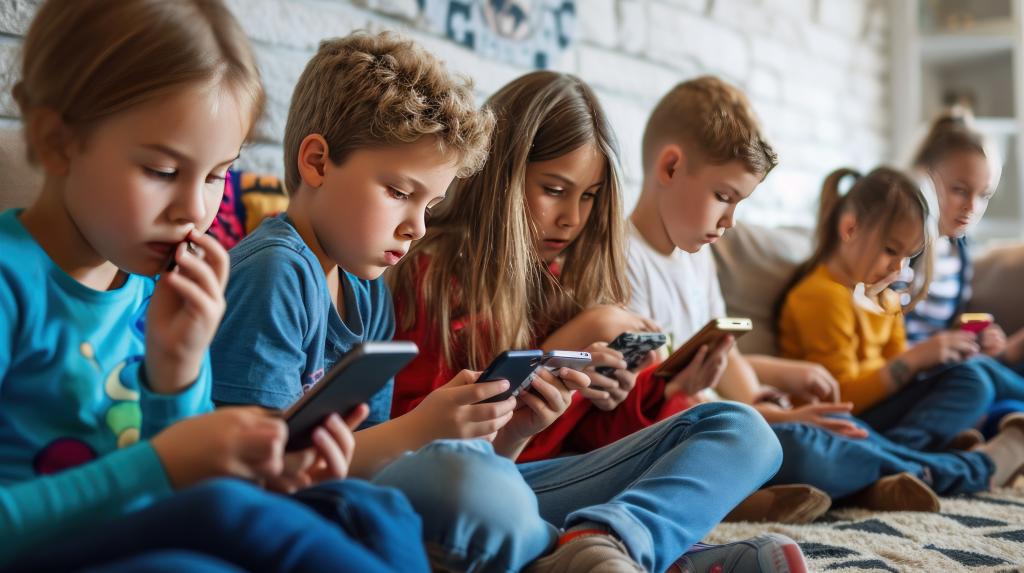New York City is on the verge of banning cellphones in schools because too many students are addicted to their screens. Several Long Island school districts are suing social-media companies, saying that kids’ phone use is causing record levels of mental illness.
But phones are doing damage to us parents, as well: The relentless connection to our kids may be driving our own anxiety sky-high.
A 2022 Harvard study found that 18% of teens were suffering from anxiety . . . as were 20% of mothers and 15% of fathers.
Of course, parents have always worried. That’s basically the job description.
But until about 15 years ago, we had no option but to learn to deal.
Today? Even though the murder rate is lower now than it was in the 1970s, ’80 and ’90s when many of today’s parents were children, kid trackers have become a $100 billion market, promising parents peace of mind.
As if! You want peace of mind? Get a time machine.
Somehow, way back when my mom let me walk to school as a kindergartener — I know, call the cops — she could wait till 3 p.m. to see me again.
No texts. No tracking.
In that way, she, like most other parents back then, learned to believe in me, in our neighbors and even in her own parenting. All were good enough to keep me safe.
Imagine how great that would feel: Trusting that all was well . . . because you didn’t have a choice.
The thing is: Trust is a muscle. It has to be exercised to get strong.
My mom’s trust muscle grew because it got daily exercise, thanks to the social norms of the time.
Mobile phones stop that growth from happening.
Instead of getting accustomed to being out of touch for a while, phones have us seeking — and getting — addictive hits of reassurance, all day long, that our kids are OK. Only constant connection soothes us.
I consider that arrested development . . . of us as parents.
In “The Anxious Generation,” Jonathan Haidt explains attachment theory: Kids need at least one adult that they know will always be there for them.
This adult is their secure base, whose attachment allows them to go off-base and explore.
As soon as kids can crawl, they scootch off to the dog or toy (or Ming vase), glancing backward: Yup, mom’s still there.
When the dog barks, they scurry back. On-base, they’re comforted. Off-base, the learning occurs. Off they go again.
But a cellphone means the child is less likely to internalize that secure base, because they never have to truly detach — and neither does the parent.
I read once about a mom who wanted to let her daughter walk alone by the creek, a childhood experience the mother had loved as a girl. So she gave her kid a smartwatch — as if this activity could not be allowed without one.
When the girl was off on her adventure, her bike chain fell off . . . and she called her dad, who rushed over and fixed it.
To the mother, this proved the wisdom of the technology. But to me, she’d given her daughter the opposite of her childhood experience.
The girl didn’t get a chance to solve her problem. The parents didn’t get a chance to see her succeed on her own.
And without that feedback, parents aren’t getting the information that would allow them to let go a little more.
Another problem: Some mobile devices can let us spy on our kids’ bad behavior.
But that, too, disrupts the off-base experience. At one time, kids had a chance to be good or bad and deal with the consequences themselves. And parents had no ability to know — or fret about — all the details of our kids’ minute-by-minute lives.
Without the opportunity for real separation, we’re missing out on our half of the attachment cycle: us letting go, us being afraid, us having them come back, and then letting them go off again.
With technology tethering us, both generations lose out.
I know most parents use the cellphone connection for convenience, not control. Most feel it lets them give their kids more freedom, not less.
But once we have the ability to watch, assist and reassure from afar, we’re no longer forced to trust our kids out there. We’re tricking ourselves into a form of false freedom.
Today’s tech relieves us of the pain of truly letting go. But the less we need to trust our kids, the less the trust muscle develops.
And if you’re wondering why being more in touch with our kids would make us more anxious about them, that’s why: The opposite of trust — the opposite of fiercely believing our kids can handle anything — is anxiety.
Lenore Skenazy is president of Let Grow, the nonprofit promoting childhood independence, and founder of the Free-Range Kids movement. Adapted from After Babel substack.
